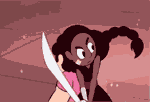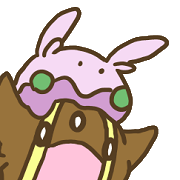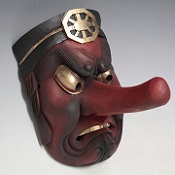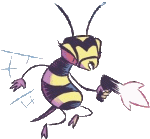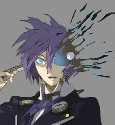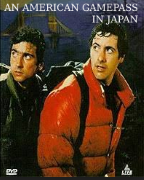|
I know it's a copy error but there's something appealing about any samurai of any house knowing a lot about important Crab leaders, probably because they are very loud.
|
|
|
|

|
| # ? Apr 24, 2024 09:46 |
|
i have no idea what you're talking about and certainly wasn't deafened by Hida Kisada
|
|
|
|
Mors Rattus posted:Crab Clan: You get +1 Earth and +1 Fitness. You have base 30 Status. The Crab Clan lives at the southern border, standing guard on the Kaiu Wall around the Shadowlands, where the forces of Jigoku lie. The Crab Clan are rowdy by Rokugani standards, often rude and generally quite pragmatic. They have no patience for weakness of any kind, as any weakness could bring disaster to the entire group. You cannot, after all, expect honor or peace from goblins and demons. All Crab Clan characters have: So, to confirm, does this mean they all look Tainted, or they can all recognize Taint in others?
|
|
|
|
Joe Slowboat posted:So, to confirm, does this mean they all look Tainted, or they can all recognize Taint in others? The latter. It's a quick list of 'every CLAN person knows X, Y, Z'
|
|
|
|
Joe Slowboat posted:So, to confirm, does this mean they all look Tainted, or they can all recognize Taint in others? The latter, yeah, that was my poor phrasing.
|
|
|
|
Legend of the Five Rings: The Makings of A Sam So, having picked a clan, our lifepath journey continues with: 2. What family does your character belong to? Even within a clan, the different families provide variety. Crab Hida Family: +1 Earth Ring, +1 Command, +1 Tactics. Base Glory 44. The Hida stand eternal guard on the Shadowlands to keep the Empire safe from Jigoku's armies. They descend from the Kami Hida, and tend to be large, strong, tough and impatient with weakness. They are pragmatic thanks to their harsh duties and have little time for the polite fictions of courtly life. They are often rather bitter about the condescension others show, mocking their manners and dress - especially given the costs they pay to keep those courtiers safe. Hiruma Family: +1 Air Ring, +1 Skulduggery, +1 Survival. Base Glory 39. The Hiruma are the scouts of the Crab, warning of attacks and raids from beyond the Wall. Their warning allows the Crab to respond quickly, but because of the danger, they rotate constantly between service beyond the Wall and within the Empire, where they work as scouts, messengers and yojimbo. They tend to be slender and quick, relying on speed over raw physicality. Kaiu Family: +1 Fire Ring, +1 Smithing, +1 Labor. Base Glory 40. The Kaiu are builders - of the Wall, yes, but also of the arms and armor of those who guard it. They are also responsible for the network of roads in Crab lands that allow them to move across the Wall so quickly, and the siege engines they use against the forces of the Shadowlands, and the fortresses spread across Crab holdings. There's not a lot of problems they don't try to solve with engineering. Kuni Family: +1 Earth Ring, +1 Survival, +1 Theology. Base Glory 40. The Kuni are the most feared of all shugenja families, rooting out corruption in the Crab and the Empire. They will use any means they have to burn it out, and evne the Hida can rarely stomach all their methods. They are even willing to study, observe and dissect Shadowlands monsters, despite the risks this places their souls in. Yasuki Family: +1 Water Ring, +1 Commerce, +1 Design. Base Glory 39. The Yasuki are talkative, small people who do not fit most Crab stereotypes, due to being a former Crane family that broke away in the third century; the Crane still haven't forgiven the Crab for that, quite. The Yasuki were the first true masters of mercantile industry, and they see to it that the Crab armies remain fed, equipped and strong, even if that means shady deals every so often. Their trade network crosses the entire Empire, and they could show up anywhere. Crane Asahina Family: +1 Water Ring, +1 Aesthetics, +1 Theology. Base Glory 40. The Asahina seek harmony and peace, and their pacifism and compassion set them apart even from other Crane. They use art and prayer to try and heal the world, spreaidng peace throughout the Empire. They know that peace requires sacrifice, of course - and it's a sacrifice they will happily make, if it means a better Empire. Daidoji Family: +1 Earth Ring, +1 Fitness, +1 Tactics. Base Glory 40. The Daidoji are the practical, hardworking military core of the Crane. They are dedicated to service and are often underappreciated, despite the Iron Crane units, the yojimbo and the Daidoji Trading Council that all work to support the rest of the clan. They are selfless in service, and will do whatever must be done to protect the Crane. Doji Family: +1 Air Ring, +1 Courtesy, +1 Design. (That's the Courtesy skill, not the virtue. ...names!!!) Base Glory 44. The Doji descend from the Kami Doji, and they are the embodiments of the arts and culture of the court. No major court event is complete without the Doji there, spreading art, friendshop and...well, usually gifts, but the Crane have been in a bit of trouble lately. Their communication network is unrivaled in terms of rumor and news of court, and few can afford to offend them easily. Kakita Family: +1 Fire Ring, +1 Aesthetics, +1 Meditation. Base Glory 44. The Kakita, unlike the Doji, tend to pick a single skill and attempt to master it entirely, rather than merely being good at many. Their focus is unrivaled, and while they are as graceful and pretty as the Doji, they tend to be more athletic. They are known for producing some of the best duelists in the Empire. Dragon Agasha Family: +1 Fire Ring, +1 Medicine, +1 Smithing. Base Glory 40. The Agasha were founded by a pacifist, but are now militant. Once they were mystics, but now they combine that with solid practicality. They are practitioners of alchemy, metallurgy and medicine, mixing practical chemistry with mystical spirit-calling. It's unique as an approach, and occasionally it explodes on them horrifically, but they find they often learn more from their failures than their successes. Kitsuki Family: +1 Air Ring, +1 Government, +1 Sentiment. Base Glory 44. The Kitsuki are the courtiers of the Dragon, but are quite unusual for courtiers. They are well-known for their perception, and their unique investigative techniques which rely on forensic evidence rather than testimony. They are a rather small family that often become magistrates as well as courtiers. In either role, they have a knack for seeking out truth. Mirumoto Family: +1 Water Ring, +1 Fitness, +1 Tactics. Base Glory 44. The Mirumoto are most famous for their unique two-sword fighting style, niten, but they are also managers of the clan, working to allow the Togashi monks to pursue enlightenment in peace. They are surprisingly practical as a result, and happy to help their peasants. They are the largest of the Dragon families, and are the ones usually thought of as the face of the clan, as they are the most common outside Dragon lands. Togashi Order: +1 Earth Ring, +1 Fitness, +1 Theology. Base Glory 45. The Togashi are followers of the Kami Togashi, and are more a monastic order than a family. They welcome anyone willing to embrace their beliefs and challenges - which begin with actually finding their mountain monasteries. The monks and nuns of the Togashi wander the Empire, telling koans and practicing martial arts, adorned by mystic and beautiful tattoos. Lion Akodo Family: +1 Earth Ring, +1 Command, +1 Government. Base Glory 44. The Akodo are masters of strategy and tactics, embodying the discipline of the Lion. They are warrior-scholars, studying war and battle in total, with no part of it too small to study. It is a common saying that no army led by an Akodo has ever known defeat, and they try to keep it as true as they can. Ikoma Family: +1 Air Ring, +1 Composition, +1 Performance. Base Glory 40. The Ikoma are the best storytellers in the Empire, using their work to extol the virtues of Bushido and by extension the Lions. They are the Empire's greatest historians as well, despite that being the offical role of the Dragons - at least when it comes to warfare and personal legends. They are also the most expressive Lions, permitted to show emotion more openly than most samurai. Kitsu Family: +1 Void Ring, +1 Survival, +1 Theology. Base Glory 40. The Kitsu descend from spiritual beings, and as a result, some of their number can speak to spirits. They are extremely traditional and conservative even by Lion standards, and even those without the gift of spirit speech answer to their ancestors, keeping genealogies and tending to the many tombs and shrines of the honored dead. Matsu Family: +1 Fire Ring, +1 Command, +1 Fitness. Base Glory 44. The Matsu are the brave heart of the Lion and the largest of all families in the entire Empire. They form the core of the Lion armies, and descend from one of the best samurai in the early empire. In her honor, they maintain many matriarchal traditions and exclusively female military units. They are the harsh militarists, and the basis for most Lion stereotypes, due to their fiery, unrelenting and fiercely honorable nature. Phoenix Asako Family: +1 Air Ring, +1 Culture, +1 Theology. Base Glory 40. The Asako are quiet, scholarly types who leave the Isawa to run the clan. The Asako focus on wisdom even more than knowledge, and their work is usually designed to advance their spiritual path as well as the clan's agenda. They are the clan's courtiers, and are beloved across the empire as court scholars and tutors. Isawa Family: +1 Fire Ring, +1 Meditation, +1 Theology. Base Glory 44. The Elemental Masters of the Council of Five are the rulers of the Phoenix, and almost always, they are Isawa. The family is one of the eldest shugenja families in the Empire, and they've had centuries to learn to call on the spirits. Some think them arrogant, but at heart, they are pious and dutiful in their devotion to balance and harmony. Shiba Family: +1 Water Ring, +1 Courtesyt, +1 Tactics. Base Glory 40. The Shiba descend from a Kami and provide the clan's champion, but they have long been servants of the Isawa rather than masters. They focus largely on keeping the clan safe - and their great weapon in doing so is diplomacy, not force. They are expected to be scholars as well as warriors, and tend to understand the shugenja more than most bushi families do. Scorpion Bayushi Family: +1 Fire Ring, +1 Design, +1 Courtesy. Base Glory 44. The Bayushi are charming, ruthless and vicious, working hard to appear to be just as villainous as their legends claim they are. They tend to the sinister, favoring blackmail, poison and seduction as their tools, but always working to avoid becoming true villains. As long as they achieve a stable and prosperous Empire, however, the ends justify the means. Shosuro Family: +1 Air Ring, +1 Performance, +1 Courtesy. Base Glory 40. The Shosuro are known to outsiders largely as excellent actors and performers. Most of the Empire fails to realize how true that is, however - they are the best of the Scorpion spies, masters of disguise. They are good entertainers, but their skills are just as useful towards darker ends. Soshi Family: +1 Air Ring, +1 Design, +1 Theology. Base Glory 40. The Soshi tend to be overlooked, and prefer it that way. They are subtle manipulators, using rumor and whispers rather than more obvious tactics. However, their preference for waiting for the perfect moment tends to make them overly cautious and prone to overplanning. Yogo Family: +1 Earth Ring, +1 Composition, +1 Theology. Base Glory 39. The Yogo are cursed - every one of them will betray the one they love most. They try to ignore the curse by focusing on their work and duty over all else. They've studied prayers and wards, constantly looking for ways to break their curse, and as a result have mastered many techniques to identify and fight evil magic. They are extremely diligent and almost terminally unappreciated. Unicorn Ide Family: +1 Water Ring, +1 Commerce, +1 Courtesy. Base Glory 40. The Ide are the Unicorn most frequently seen outside their lands, as they are the diplomats, couriers and merchants of the clan. They are thoroughly Unicorn, but tend to have learned how to blend their unique traditions and customs with those of the Empire, working to prove that, yes, the Unicorn are actually part of it. They tend to be calm, competent and friendly, looking to make allies across and sometimes beyond the Empire. Iuchi Family: +1 Air Ring, +1 Fitness, +1 Theology. Base Glory 40. The Iuchi are priests, mostly, who provide most of the clan's shugenja. Their practices often date back to the time the Unicorn spent traveling foreign lands, and they're used to fighting alongside the clan's warriors. They practice sorcery known as meishodo, which uses talismans and names to manipulate spirits, a practice unknown elsewhere. They tend to be more open to exploring new methods and paths than more traditional groups. Moto Family: +1 Fire Ring, +1 Command, +1 Finesse. Base Glory 40. The Moto are often seen as the least civilized Unicorns - stocky, heavily bearded and armed strangely by Rokugani standards. They have little use for the softer parts of the Empire - they are warriors born, always seeking battle, and they embrace the harsh life of the frontiers. Their heritage and culture are often questioned by more traditionalist samurai, but their skill and bravery are not. Shinjo Family: +1 Water Ring, +1 Fitness, +1 Government. Base Glory 44. The heart of the Unicorn, they are the descendants of explorers that followed the Kami Shinjo beyond the Empire. Their love of discovery is not gone, and they enjoy travel a lot. They lead the Unicorn, working to keep the clan together and in service to the Empire. They are master equestrians and scouts, and while they prefer peace by far, they do not flinch from war. Utaku Family: +1 Earth Ring, +1 Fitness, +1 Tactics. Base Glory 44. The Utaku have embraced Bushido far more than any other Unicorn family - and that's saying something. Their elite battle maidens, the shiotome, are embodiments of bushido, and not even the Lion would question their honor. They are strictly matriarchal, with the women riding to war and the men serving as infantry or stablehands and househusbands - unusual even among the Unicorn. They are the best heavy cavalry and horse breeders in the Empire. From there, we get 3. What is your character's role and school? Not all of the schools to be featured in the final core rules are presented in the beta, however. As for role - well, you have bushi (warriors), courtiers (politicians), shugenja (priest-wizards), monks (enlightened mystics, pretty much just the Togashi here, but many samurai become monks when they retire), and ninja (never admitted openly, of course, but assassins and spies, largely found among the Scorpion). Every school fits one of the roles; the role has no mechanical effect, but gives a general sense of what duties the samurai in the school are expected to perform. Every school has access to special techniques - katas, shuji, rituals, invocations, kiho...we'll get into what those actually do later. They're your cool powers. Crab schools tend to be highly practical and often train their students to expect to die - and so to bring out the best they can against the death that will come. Hida Defender (Bushi): Base Honor 40. The school of fortitude, courage and protection. They do not face honorable foes, so they cannot afford to act as if it's a fair fight. They specialize in killing monsters and have developed a fighting style that allows them to do so well. +1 Earth Ring, +1 Water Ring, +1 to five of Fitness, Martial Arts [Melee], Martial Arts [Ranged], Martial Arts [Unarmed], Meditation, Survival or Tactics. They can learn Kata, Rituals and Shuji, and begin the game with the Katas Lord Hida's Grip and one of Striking as Earth or Striking as Water. Their school ability is Way of the Crab. They ignore the Cumbersome quality of armor they wear, and once per scene before making a check to resist a crit, they may reduce the severity of the cirt by (Physical Resistance of armor + School Rank), to a minimum of 0. Kuni Purifier (Shugenja): Base Honor 35. The Kuni Purifiers master prayers and power to deny the darkness, specializing in using earth kami powers to banish evil. They work to understand the nature of the Shadowlands threat, and as a result, a not insignificant number fall to corruption. They paint hteir faces with stylized Kabuki-esque patterns to protect their souls form the Taint and tend to be rather paranoid. +1 Fire Ring, +1 Water Ring, +1 to three of Martial Arts [Melee], Medicine, Sentiment, Skulduggery, Survival and Theology. They can learn Invocations, Katas and Rituals. They begin play with the Invocations Armor of Earth and Jade STrike, one of the Katas STriking as Earth or Striking as Fire, and the Rituals Commune with the Soirits and Threshold Barrier. Their school ability is Gaze into Shadow. When they make a check targeting a being they know to either have the Shadowlands Creature ability or the Shadowlands Taint disadvantage, they may choose up to (School Rank) kept dice showing Strife symbols and alter them to any face with a Success symbol on it. Crane schools are generally focused on teaching proper decorum, regardless of what else they teach. Many tend to see the Crane as priggish or haughty as a result, but they all have at least a basic appreciation for the arts. Doji Diplomat (Courtier): Base Honor 50. The masters of court games and favors, the leading edge of fashion and culture. They are rarely unkind - they don't need to be. They just have to be silent and snub you. Their networks of favors and gifts let them play easily in the social nets of the Empire. +1 Air Ring, +1 Water Ring, +1 to five of Aesthetics, Composition, Courtesy, Culture, Design, Government and Martial Arts [Ranged]. They can learn Kata, Shuji and Rituals. They begin play with one shuji from among Cadence, Shallow Waters or Whispers of Court, and the shuji Lady Doji's Decree. Their school ability is Speaking in Silence. Once per scene, when making a check to persuade or influence someone, they may add (School Rank) kept Ring dice to their roll which show an Opportunity symbol. Kakita Duelist (Bushi): Base Honor 50. They focus on striking only once, mastering the single perfect iaijutsu strike. This, they believe, is the pinnacle of martial skill. Other skills are not neglected, but they aren't focused on, either, at the Kakita Dueling Academy. Some critique their singlemindedness, but they tend to be the best duelists in the Empire. +1 Earth Ring, +1 Air Ring, +1 to five of Design, Courtesy, Fitness, Martial Arts [Melee], Meditation, Sentiment and Smithing. They can learn Kata, Shuji and Rituals. They begin with the Iaijutsu kata and one shuji - either Shallow Waters or Weight of Duty. Their school ability is Way of the Crane. When they inflict a crit, they may increase or decrease its severity by up to (School Rank). Dragon Schools tend to be pretty eclectic, focusing on individuality and enlightenment through skill or knowledge. Kitsuki Investigator (Courtier): Base Honor 45. They're a pretty recent school, formed after Agasha Kitsuki saved the Mirumoto daimyo's life via forensic evidence. They use observation, experimentation and logic to find the truth, which is very abnormal for the Rokugani judiciary, which relies on testimony entirely. They find that truth and justice usually align, which can bother those in power, but they don't care. They love to work as magistrates as well as being courtiers. +1 Air Ring, +1 Water Ring, +1 to five of Culture, Government, Martial Arts [Melee], Medicine, Sentiment, Skulduggery and Survival. They can learn Kata, Shuji and Rituals. They begin with one kata from among Striking as Air or Striking as Water, and the shuji Shallow Waters. Their school ability is Kitsuki's Method. When making a check to investigate, they may consider their Skill to be equal to (School Rank) if it's lower. If it's higher, they instead add one kept Ring die showing an Opportunity symbol. Togashi Tattooed Order (Monk): Base Honor 40. The Togashi Order will accept anyone, if they can prove themselves worthy at a monastery. They focus on muscular training, the Tao of Shinsei, and wandering the land to seek enlightenment. They are known for their mystic tattoos, and only their deepest ise zumi initiates learn that the power of the tattoos is that they are mixed with the blood of the Kami Togashi. +1 Earth Ring, +1 Void Ring, +1 to four of Fitness, Martial Arts [Melee], Martial Arts [Unarmed], Meditation, Survival and Theology. They can learn Kiho, Rituals and Shuji. They begin the game with the shuji Lord Togashi's Insight and three Kiho from among Earth Fist, Earth Needs No Eyes, Flame Fist, Chi Protection or Water Fist. Their unique ability os Blood of the Kami. They get (School Rank) tattoos, which each correspond to a skill - Fitness is Mountain, Survival is River, Skulduggery is Cloud, Command is Volcano, Sentiment is Bat, Martial Arts [Unarmed] is Tiger, Meditation is Lotus and Medicine is Vine. When performing a check for any skill they have a tat for, they add one rolled Ring die showing an Opportunity symbol. Lion Schools focus on warfare, and every student learns to fight - it's good for the soul. Even for the non-warriors. Akodo Commander (Bushi): Base Honor 50. The Akodo War College teaches control - of the field, of the flow, of the self. They study Leadership, a text written by the Kami Akodo himself, and are trained both to fight and to be leaders, treating war almost as a game of go. They strike without hesitation, because thought and action must be one, as they minimize losses while bringing victory. +1 Earth Ring, +1 Water Ring, +1 to five of Command, Fitness, Government, Martial Arts [Melee], Martial Arts [Unarmed], Meditation and Tactics. They can learn Kata, Shuji and Rituals. They get kata from among Striking as Earth and Striking as Water, and the shuji Lord Akodo's Roar. Their school ability is Way of the Lion. When they succeed at an Attack or Support action check during a skirmish or mass battle, they remove up to (School Rank) Strife from themselves and, if they do, add that many bonus successes to the check. (I assume you need to have the Strife to remove it.) Ikoma Bard (Courtier): Base Honor 45. The Ikoma Bards are historians, storytellers and living monuments to the heroes of the past. They don't just preserve knowledge, they share it widely. They are rarely frontlines combatants, but instead fight the battle of words, remembering glorious deeds and teaching of battles past. They also support other Lions in seizing glory regardless of danger, letting them know that no hero will die forgotten. +1 Water Ring, +1 Fire Ring, +1 to five of Composition, Courtesy, Culture, Martial Arts [Ranged], Performance, Sentiment and Tactics. They can learn Kata, Shuji and Rituals. They begin with the kata Warrior's Resolve and one shuji from Fanning the Flames or Tributaries of Trade. Their school ability is Heart of the Lion. When they perform a check with a Social skill targeting one or more characters, they may gain up to (School Rank) Strife to remove that amount from the targets, divided as they choose. They may do the same to remove up to (School Rank) Strife from themselves to give to their targets, the same way. Phoenix Schools are all about theology and reverence for the Tao and the spirits. Isawa Elementalist (Shugenja: Base Honor 40. These guys are the undisputed masters of the spirits, seeking knowledge for centuries to better understand the kami, the Fortunes and the elements. They have great power, but their knowledge of the price of that power means they are reluctant to use it save in times of need, for fear of upsetting the natural balance. +1 Fire Ring, +1 Water Ring, +1 to three of Composition, Courtesy, Medicine, Meditaiton, Performance and Theology. They can learn Invocations, Shuji and Rituals. They begin with three invocations from Extinguish, Grasp of Earth, Path to Inner Peace or Tempest of Air, and the rituals Commune with the Spirits and Divination. Their school ability is One with the Elements. Once per scene, when making a check to activate an invocation technique, before assembling their dicepool they may reduce the check's TN by (School Rank). Shiba Guardian (Bushi): Base Honor 45. They are the sworn protectors of the Isawa, working as bodyguards. They are both scholar and warrior, and prefer to avoid combat when possible - though they are quite good at it, despite not liking it, due to their long practice in moving in harmony with the elements. +1 Earth Ring, +1 Water Ring, +1 to five of Courtesy, Fitness, Martial Arts [Melee], Meditation, Survival, Tactics and Theology. They begin with the kata Lord Shiba's Selflessness and one kata from Striking as Earth or Striking as Water, and can learn Kata, Shuji and Rituals. Their school ability is Way of the Phoenix. Once per scene, when a character at range 0-3 makes a check, they may negate up to (School Rank) Stress symbols. Scorpion Schools are very practical and often very good at lying and spotting lies. Bayushi Manipulator (Courtier): Base Honor 35. Practiced deceivers and tempters, masters of finding and exploiting weaknesses. They are the shadow to the Doji's light, and no court is truly complete without them. They accept their role as villains, and in doing so, ensure that no real villains actually show up. +1 Air Ring, +1 Fire Ring, +1 to five of Courtesy, Command, Design, Martial Arts [Unarmed], Performance, Sentiment and Skulduggery. They can leanr Kata, Shuji and Rituals, and begin play with the shuji Lord Bayushi's Whispers, and one of Cadence or Rustling Leaves. Their school ability is Weakness Is My Strength. When they exploit a target's disadvantage as part of a Scheme action, they may reroll up to (School Rank) additional dice. Shosuro Infiltrator (Ninja): Base Honor 30. They are actors, acrobats and masters of surprise and disruption, sowing chaos and vanishing into the dark. They are often used not just to perform actual missions, but to be distractions that disguise the actual mission, faking (and failing at) ninja assassinations to disguise what was actually going on...or performing ninja assassinations. Well, shinobi assassinations. There are no ninja. Shinobi are hella illegal, of course. +1 Air Ring, +1 Fire Ring, +1 to five of Courtesy, Fitness, Games, Performance, Martial Arts [Melee], Martial Arts [Unarmed] and Skulduggery. They can learn Kata, Rituals and Shuji. They begin with the kata Soaring Slice and one shuji from either Whispers of Court or Sensational Distraction. Their school ability is The Path of Shadows. When performing an Attack action against a target unaware of their presence or who is Incapacitated or Unconscious, they increase their weapon's base damage and deadliness by (School Rank). Unicorn schools all teach how to ride and travel easily, but are otherwise quite innovative and quick to borrow working methods from other cultures. Iuchi Meishodo Master (Shugenja): Base Honor 40. The Unicorn have learned much of magic from outside the Empire, and their focus is the making of magical talismans. While the Meishodo Masters are priests, they prefer to explore the world rather than lock themselves away in a library or temple, and their magic is unique, wielding foreign words of power to bind spirits into talismans that others can use as well. +1 Earth Ring, +1 Water Ring, +1 to three of Aesthetics, Design, Martial Arts [Melee], Meditation, Survival and Theology. They can learn Invocations, Shuji and Rituals. They begin with two invocations from Grasp of Earth, Jurojin's Balm or Rushing Wave, the ritual Commune with the Spirits, and one shuji from either Weight of Duty or Well of Desire. Their school ability is The Way of Names. As a downtime activity, they can make a TN 2 Deisgn check using any ring to bind a spirit to a vessel and make a meishodo talisman for one invocation of the corresponding element that they know. While they hold the talisman in their possession, the TN to activate that invocation is reduced by 1. They can give the talisman to another shugenja, allowing them to use the invocation even if they don't know it and reducing the TN to activate it by 1, but the talisman ceases to work after (School Rank) uses. They may have up to (School Rank) talismans at once, but only one per invocation. Shinjo Outrider (Bushi): Base Honor 40. These are the core of the Unicorn forces, focusing on speed and flexibility. They learn reconnaissance and horsemanship, and no one is more mobile than they are. They prefer the cavalry bow to melee combat, and are very accurate with it. They also learn to live off the land and exploit terrain. +1 Earth Ring, +1 Fire Ring, +1 to five of Commerce, Fitness, Martial Arts [Melee], Martial Arts [Ranged], Medicine, Survival and Tactics. They can learn Kata, Shuji and Rituals. They begin the game with one kata from either Striking as Fire or Striking as Water, and the shuji Lady Shinjo's Speed. Their school ability is Born in the Saddle. Once per scene, before rolling dice, they may declare how they are directing their horse to help them and how the horse should be helpful to reduce the TN of their check by (School Rank). The horse must, obviously, be present. Once your school is picked, you get 4. How does your character stand out within their school? There's always ways for students to excel in different areas. You choose one of the following:
Once we know that, we ask: 5. What is your character's duty to their lord? This is where you define your Giri. Bushi tend to be bodyguards, soldiers, magistrates, executioners or generals. Courtiers tend to be artisans, performers, guides, diplomats, magistrates, seneschals or spymasters. Shugenja tend to be priests, researchers, librarians, warrior-priests, shrine keepers or spiritual advisors, but rarely might be guards, artisans or magistrates. Monks who no longer belong to a Clan tend to serve their order rather than a lord, serving as priests, temple caretakers, charity workers, librarians, teachers or pilgrims. Monks that still belong to a Clan usually have similar duties to shugenja. Ninja serve as assassins or infiltrators, but usually have some kind of cover guise. A ninja's giri is almost always secret, and the player should also decide what their officially stated giri is as well as their true one. When doing this, you also work with the GM to decide who your lord is and what they're like. You might work for a clan magistrate, a city governor, a provincial daimyo or even a family daimyo. You may even have two lords, such as if you are an Emerald Magistrate - the Emerald Champion and your clan lord. The GM may or may not choose to ask you to make a second giri if this is the case. 6. What does your character long for? This is where you define your Ninjo. This is the challenge you set to make your character confront the ideals and cost of Bushido. 'Be an honorable samurai' or 'obey my lord' are inappropriate - but maybe 'punish samurai who abuse their power by dishonoring themselves' or 'win my lord's love' are good, since they provide room for conflict. 7. What is your character's opinion of their clan? Do they embrace all of the clan's ideals and goals? Do they conflict with the traditional views of the clan or their policies? You pick one of the following:
8. What does your character think of Bushido? Samurai are meant to venerate the code, but some clans and families care more about some tenets than others, and some samurai reject bushido entirely. Do you agree with your clan? Do you differ on certain points or even reject parts of bushido? Why? Pick one of the following:
Next time: Advantages and disadvantages in chargen.
|
|
|
|
Alien Rope Burn posted:That's not to say you can't rewrite them to be better, mind, but too often they were just written as smug, self-promoting ciphers from my experience. If any part of L5R has been stuck in Wick's shadow, it's the Scorpion. As for the Crab, I thought their disregard of bushido was just being excused from Courtesy, and using whatever tactics are effective against the Shadowlands.
|
|
|
|
Halloween Jack posted:I'm not super into the lore; just enough to play 4th edition without getting stuff wrong. But I was thinking that even after Wick left, there was some silly Scorpion stuff that, at least, was never specifically retconned The first thing that comes to mind is that they have a grove of evil magic trees that is just a little off of the main road through their demesne. I always liked how Traitor's Grove A) used blood magic to bind traitors' souls into trees, B) was well-known enough for children to go there on rock-throwing field trips, and C) was somehow ignored by the rest of the empire. Wait, did I say like? The opposite of that.
|
|
|
|
Ughhhh permanent disadvantages from getting unlucky in combat ughhhh Hopefully disadvantages are less, uh, absolutely there to gently caress you over than they were in editions previous (I didn't get quite through the playtest packet because what I saw beyond 'hey I wanna steal this approach to rings and skills for 4e' didn't really wow me).
|
|
|
|
I recently discovered the Primitive Technology youtube channel, so I gotta ask: besides Wurm, are there any other games with a pre-Bronze Age setting?
|
|
|
|
Joshua AC Newman wrote an amazing little game called THE BLOODY HANDED NAME OF BRONZE which you should check out. It's like... you play epic bronze-age myths and the game is exceedingly clever about it. The vibe is like... bronze is new and scary and civilization is barely a thing. It's very cool.
|
|
|
|
gradenko_2000 posted:I recently discovered the Primitive Technology youtube channel, so I gotta ask: besides Wurm, are there any other games with a pre-Bronze Age setting? There are a few others, but they're either obvious comedy joke games, or basically just D&D with a -lithic skin on top.
|
|
|
|
gradenko_2000 posted:I recently discovered the Primitive Technology youtube channel, so I gotta ask: besides Wurm, are there any other games with a pre-Bronze Age setting? RuneQuest from back in ye olde days was set in very primitive times. I haven't kept up with more recent editions to know whether that's still the case. Talislanta is in a weird place that sort of fits that bill; a super-magic civilization blew itself up and hosed the world, so there are some city-states that are pretty urbane but the vast bulk of the world is savages and wilderness. Kinda Conan-ish in that regard.
|
|
|
gradenko_2000 posted:I recently discovered the Primitive Technology youtube channel, so I gotta ask: besides Wurm, are there any other games with a pre-Bronze Age setting?
|
|
|
|
|
Seeing Starfinger just makes me increasingly sad that Alternity never really took off. Alternity has levels, but they serve just to increase skill ranks and buy proto-feats. If you have a big rear end laser gun, it's a dangerous weapon. It doesn't matter who's holding it, who it's pointing at, if you get a good hit with it, someone's going to be hurting. You don't have to throw it away and buy a new one every two months that is inexplicably more powerful that for some reason you couldn't purchase before. The real shame is that Starfinger has some great ideas. Who wouldn't want to stick a mod in their laser gun to make it shoot holy lasers? That's just loving awesome. A lot of the class concept are, on the surface, really cool. It's the lovely mechanics under the hood that are letting everything down.
|
|
|
|
gradenko_2000 posted:I recently discovered the Primitive Technology youtube channel, so I gotta ask: besides Wurm, are there any other games with a pre-Bronze Age setting? Are there even any Bronze Age games? The only one that springs to mind is Hillfolk.
|
|
|
|
gradenko_2000 posted:I recently discovered the Primitive Technology youtube channel, so I gotta ask: besides Wurm, are there any other games with a pre-Bronze Age setting? I imagine you're more interested in a core game focus, but the Sundered World Dark Era for Chronicles of Darkness is kinda cool.
|
|
|
|
https://www.youtube.com/watch?v=2pcGGKtPpSE
|
|
|
|
Valatar posted:Seeing Starfinger just makes me increasingly sad that Alternity never really took off. Alternity has levels, but they serve just to increase skill ranks and buy proto-feats. If you have a big rear end laser gun, it's a dangerous weapon. It doesn't matter who's holding it, who it's pointing at, if you get a good hit with it, someone's going to be hurting. You don't have to throw it away and buy a new one every two months that is inexplicably more powerful that for some reason you couldn't purchase before. It wouldn't even be the first. Buck Rogers XVc was built on a AD&D 2nd edition framework and it performed reasonably well. If I was going to change things, I'd totally drop the leveling equipment and make your level or skill adds or multiplies weapon damage like others have suggested. I would however have a base damage and armor value, so people aren't blowing open bulkheads and tanks with hold-out pistols. Base damage would have to exceed armor value for the level/skill multipliers to take effect, so weapon selection, mods, ability scores, and such become important. The level/skill multiplier would largely be an abstraction of modern firearms combat: you don't have to do called shots on the head or some gap in their armor, the damage is already baked into multiplier, it's just assumed that you're skilled enough that you can do headshots pretty much naturally and makes sense that you'd be aiming for maximum, surgical efficiency in fight. It would also work with the abstraction that's hit points, in that it's not just meat, but combat experience (that reduces hazards, avoids openings, and finds effective use of cover) and luck. Being 5th level whatever makes sense that you could mow through 1st level mooks John Wick style, but another 5th level opponent would be relatively evenly-matched and dangerous. I'd ditch ACs for the most part or rebuild them as passive evasion to-hit numbers, since the abstraction of Armor Class falls apart in modern combat, when heavy armor makes you easier to hit due to encumbrance, and then it's just a matter of how much ballistic protection/steel/ceramics you have between you and the projectile.
|
|
|
|
 Starfinger Core Rules Part #13: "Flintlocks are under most circumstances a terrible idea." Owen K.C. Stephens, Starfinger Design Lead, GenCon Q&A Transcript posted:There's nothing you can do with a flintlock that a fully automatic rifle can't do better. Swords is a different question. One of our core deities is Iomedae and she fights with swords. We've got effective technological sword options throughout your class options.  I've mentioned it before in this review, but it's worth re-mentioning: I'll mainly only be discussing how this combat differs from normal d20 combat. For the most part, combat is the same was it was in Pathfinder. There are, however, some differences:
 We also get a lot of terminology for senses, where you're "unaware", "aware of presence", "aware of location", or "observing", lots of discussion of lighting... and all the sorts of things that's essential to dungeon environments but seems less useful to a space game, unless you're largely just trying to recreate space horror/action like Aliens or Pitch Black - which I guess works given that Starfinger wants to be all space things to everybody. We have details on special abilities, the only part of which that seems new is the "See Through" ability for Kryptonians with X-Ray Vision or- Starfinger Core Rules posted:. For example, a lycanthrope with sense through (scent [blocked by silver]) can smell through walls-but not through even a thin layer of silver. Well, that's a weird example. Thankfully, my silver body stocking renders me unsmellable, and protects my essence. We get details on bonuses and penalities and what stays or doesn't stack. We also have details on area templates and effects, descriptors, durations, ranges, targeting, etc. - all mainly for spells and similar effects.  Conditions get covered here as well. New conditions include:
 Keeping this short because it'd be easy to get bogged down if I go through a full summary - and most people will already know d20 combat. Next time, we'll get into the all-new rules and, well... Next: *crashing sound* Alien Rope Burn fucked around with this message at 12:58 on Oct 9, 2017 |
|
|
|
The honor system, flaws and virtues of L5R are reminding me, probably fittingly, of Pendragon. There seems to be emphasis on faults/weaknesses as roleplaying opportunities rather than just penalties. One gained from an enemy's crit in combat could manifest as a brutal scar, a mildly crippling wound (and excuse to wear an eye patch!), a personal sore spot from wounded pride, or even PTSD.
|
|
|
|
Flaws gained in combat are rarely permanent, IIRC - most of them can be healed unless, like, you lose a body part. Those are probably permanent. However, the net mechanical effect of a flaw on relevant rolls: Pick two successful dice and reroll them. If you fail the cbeck, gain a Void Point. Void Points are extremely good and valuable.
|
|
|
|
Some of the Starfinger art is really good, but something about the way that particular artist draws the Kasatha makes it really hard to parse what the hell is going on in those pieces, or even her part of otherwise clear group shots.
|
|
|
|
[ Table of Contents
Maybe all this tactical goodness and psychological trauma has you excited to play a Vietnam War RPG, but you don't know an M16 from an M203 or a Brigadier General from a full-bird Colonel. Maybe your sole knowledge of infantry tactics comes from Commando or old reruns of Sgt. Bilko. Never fear, PATROL has you covered with a detailed overview of military organization, strategy, and tactics. By the end of it: PATROL posted:you should be more than ready to serve your country as a make-believe soldier with dice. (NB: I'm condensing a lot here, but it's all good information. Any errors in this review are entirely my own, not Erika's.) Military Basics The military is a bureaucratic organization whose mission statement is to win wars. As such, they have to have the ability to continue to function even as key parts of that bureaucracy and personnel are eliminated. On top of the staff turnover that also afflicts civilian bureaucracies, the military has to deal with hostile forces actively trying to destroy them. Because of all this, hierarchy and chain of command are paramount. In a civilian job, not doing what your boss tells you to can get you fired. In the military, it can get you put in jail. For our purposes, we're chiefly concerned with three categories of rank: Enlisted soldiers do what they're told. They have no authority over other soldiers, they just follow orders. Non-commissioned officers are usually promoted from within the ranks of the enlisted men and are responsible for turning their superiors' orders into reality. They're usually in charge of small groups of soldiers, but they don't actually set tactical or strategic objectives themselves--they just make sure the plans are carried out. Finally, officers are the ones who actually make the plans. Lower-ranked officers make tactical decisions about how to execute their objectives, while the higher-ranking officers set strategic goals for larger groups, up to and including the whole war. Unlike NCOs, officers typically aren't promoted from the enlisted ranks--they usually attended an officer training school, hold a degree, and are upper-class. Officers are also expected not to fraternize with enlisted men, because that erodes authority--there are a lot of other protocols that reinforce this divide, too, like how enlisted men and NCOs are required to salute officers and hold that salute until it's returned--unless you're in combat or there are known to be snipers lurking around or what have you. Units of troops are similarly nested and come with lots of built-in redundancy. Whole books have been written about this structure, but in brief: Divisions are commanded by generals and made up of regiments (which are commanded by colonels), which are made up of battalions commended by Lieutenant Colonels, which are made up of companies led by a captain, which are made up of platoons led by lieutenants, which are made up of squads which are organized and coordinated by NCOs. Battalions are typically the smallest field unit for organizational purposes, and unlike most of the world, which organizes forces at the regimental level, the USA organizes on the division level. Industrial Warfare Consider, as an analogy for war, constructing a building. Yes, one is all about blowing poo poo up and one is about creating something, but that aside, the analogy is pretty apt. In the past, both involved a fairly few skilled workers directing the efforts of large numbers of unskilled laborers, because that was the only way to get things done. With the advent of modern technology, fewer people can do the same work by using heavy machinery: cranes and dump trucks or tanks and artillery, as the case may be. The vast majority of the people actually prosecuting a war will never see the people they're killing: they're shelling them from kilometers away, dropping bombs on them from thousands of feet in the air, and the like. Some guys with rifles aren't really the way you win a war any more.  Coming summer 1969: So, in this industrialized hellscape of modern warfare, what role does the infantry play? If we keep with our construction site metaphor, the infantry are security guards. See, those giant machines are great for large-scale carnage, but they're really vulnerable to individual people getting up close to them and wrecking their poo poo. Just like construction sites employ security to stop people from stealing the copper pipes or taking the bulldozers for a joyride, the military employs infantry to keep the enemy away from their big shiny artillery pieces and heavy armor. Infantry also gets the unenviable job of taking and holding actual ground, so things like airfields and firebases can be built and so Charlie can't creep up behind you. Most infantry fighting is in self-defense, and to help soldiers cope with the idea that their and their allies' lives are more important than the enemy's, a lot of effort is put into dehumanizing the enemy--which of course just makes atrocities that much easier. About You So who is the typical US infantryman in 196X, where X is > 5 but <9? Well, you're probably 19-20--a baby boomer, born in the huge population explosion and economic upswing in the aftermath of WWII. You grew up learning to "duck and cover" under your desk in the event of nuclear armageddon, hearing about men in orbit on the radio, and maybe, if your family was well-off, watching The Mickey Mouse Club. You grew up with the Civil Rights Movement and the assassination of JFK, and your teachers almost certainly spent a lot of time telling you about your "military obligation." As the war dragged on and the draft expanded, you were probably thinking about that a lot in high school. Your options were basically sign up and (maybe) get into a less-dangerous service, try to get a college deferment, or get drafted--in short, there was no real way to guarantee you weren't going to Vietnam, barring deliberately injuring yourself or draft-dodging. And why are you here? Well, the prevailing theory of the day is that of the Domino Theory--basically, if one country falls to communism, so will its neighbors, and their neighbors, and on and on until we've got Reds in Mexico pushing into Texas! You might buy that line whole-heartedly, or you might think it's kinda dumb but communism is still pretty bad (you hear horror stories about Eastern Europe and South America, after all), or you might think the whole thing is just American imperialism or defense contractor fat cats lining their pockets or The Man's long game to pit the black man against the yellow.  "How about 'all of the above?'" Or, hell, the whole thing might just be a sick, pointless joke. Garrison Duty As an infantryman, more than likely you're posted to a firebase, more properly a fire support base or FSB. Think of them like old-timey Western forts out in the boonies--they range from little more than a few piles of dirt with a couple of pack howitzers to battalion-scale bases with multiple batteries of guns. The typical FSB, and likely your new home, consists of about six artillery pieces, a helicopter detachment, some engineers to build and maintain the place, and a company of infantry for security. The base itself consists of earthen berms and barbed wire barriers, with machine gun nests and watchtowers behind them, and makeshift "buildings" that are basically waist-deep pits with sandbag walls the rest of the way up to protect against mortar fire. Most of your days on garrison duty are spent carrying poo poo for the engineers, standing watch, or even shoveling out and burning the refuse from the trash pits and the latrines. Of course, since FSBs are the face of American occupation, you'll also face periodic mortar fire, sniper attacks, and the occasional "human wave" attacks where Charlie tries to overrun you with sheer force of numbers. Patrol It's the name of the game, and if there's one thing worse than garrison duty, it's a patrol. Basically, you and your platoon load up for combat and walk a beat through the bush, looking for trouble. If you're lucky, it's out in the morning and back at night--but if you were lucky, you wouldn't be in Vietnam, would you? More often you'll be out for a couple of days or weeks at a time, sleeping inside a perimeter of claymore mines as you check out known V.C. trails, visit nearby villages, and generally try to make it a little harder for Charlie to prosecute the war. Civilian life really can't prepare you for the combination of unbelievable tension and incredible boredom that is a combat patrol in Vietnam--you're pretty much guaranteed to run into the enemy, or at least their traps, at some point, but you can never predict exactly when. Maybe some bullets will whiz past your head, but usually by the time you realize it's happening and your body kicks out the adrenaline, it's already over, leaving you to deal with the aftermath. After a couple days on patrol, you might realize that Charlie lives like this all the time, and you start to see how a bunch of half-trained guerillas with lovely equipment can stymie the biggest military machine in the world. (If you're "lucky," you might be stationed at one of the real bases around Saigon or Da Nang, where you have actual bunks and an actual mess hall and don';t have to worry quite so much about snipers and mortar fire. The flip side of that is that you're likely to get sent on much longer, more involved patrols, since there's so much more stuff for your commanders to play with.) Short-Timers and FNGs Every soldier in Vietnam is obsessed with time. Draftees are one a one-year tour of duty, and they can tell you down to the minute how long is left in their tour. When you're close to the end of your tour, you're a "short-timer," and your buddies will typically do their best to keep you off the most dangerous missions, or keep you safe when you do go out--because even in 196X, getting killed when you're two weeks from retirement is a lovely cliche no one wants to see happen. You'll also find yourself the target of re-enlistment officers trying to convince you to sign on for another tour, because the Army knows that rotating out its most experienced troops is a bad idea. (One analyst famously said "We weren't in Vietnam for ten years. We were in Vietnam for one year ten times," and that lack of institutional knowledge is a huge problem for the Army.) On the other hand, new recruits are called FNGs ("loving new guys") or "cherries," and they're generally hated because stupid naivete gets people killed. FNGs get all the dangerous poo poo jobs--you were most likely to die in your first two months in-country. Oh, and because officers' tours are six months field duty, then six months desk duty, the worst FNG in your unit? Probably your LT. Good luck. About the Enemy You call them the V.C., Victor Charlie. Your South Vietnamese allies call them the Viet Cong. They call themselves the National Liberation Front, and they're a guerilla force living out in the rural parts of Vietnam, trying to unify the whole country under the communist leadership in Hanoi. They live out in the jungle, or else they blend into the civilian population--anyone could be V.C. Most of the time, all you ever see of them are tracers ripping out of the jungle, booby traps set in your path, and the occasional body left after a firefight. Depending on where (or when) you're fighting, Charlie can be anything from a poorly-organized bands of raiders hitting villages or lobbing grenades into passing trucks to a real no-poo poo army with organized brigades and officers and everything. On the other hand, the North Vietnamese Army, Nathan Charlie, is a whole other beast. For now, the presence of FWF troops means they can't mount a full-on war in the South, but plenty of them take off their uniforms and slip south on the Ho Chi Minh Trail to provide Victor Charlie with experienced officers. As things heat up, though, they start to make actual inroads into the south, rolling down with uniformed battalions, armored trucks, and artillery--hell, if you believe some of the rumors from the Marines in I Corps, they've even got tanks and helicopters. The V.C. employ lots of terror tactics--they plant bombs in public places, they assassinate teachers, doctors, and clergy, and they kill anyone who doesn't toe the party line. They are a huge threat to the rural people of Vietnam--but at the same time, any of those rural people could be Charlie, and for every village that hates the Viet Cong and is willing to help you drive them off, there seems to be another that either doesn't care, hates you more, or is actively helping them. There's simply no way of knowing who you can trust. The Kill Ratio Because the Viet Cong is a dispersed, guerilla fighting force, there's no conventional victory condition in this war. You can't just roll a column of tanks into Paris and liberate it or take a chain of islands from the Imperial Japanese Navy; Charlie will fight until they win or they're all dead. Ergo, your commanders have devised the Kill Ratio strategy: basically, your goal is to kill as many V.C. as possible, while limiting your own casualties--command estimates that Free World Forces kill 10 V.C. for every one soldier they lose--if that ratio can be kept up, we'll win the war through attrition in short order. Why no, that certainly doesn't mean that troops will artificially inflate their kill counts by counting (sometimes inflicting) civilian casualties, or that the war will become a grinding slog that chews people up morally and psychologically, why on earth would you think that?  Next Time: These Boots Were Made for Walking - How to not get killed on patrol.
|
|
|
|
Oh God. That kill ratio doctrine is the most awful military idea ever.
|
|
|
|
Horrible Lurkbeast posted:Oh God. That kill ratio doctrine is the most awful military idea ever. Welcome to the Vietnam War.
|
|
|
|
GimpInBlack posted:Industrial Warfare This whole review has been super informative, but this post and this section especially.
|
|
|
|
Did the army chiefs actually publish the doctrine? I'd think that a lot of people would cry bullshit when they heard about it.
|
|
|
|
Horrible Lurkbeast posted:Did the army chiefs actually publish the doctrine? I'd think that a lot of people would cry bullshit when they heard about it. It was very public.
|
|
|
|
Horrible Lurkbeast posted:Did the army chiefs actually publish the doctrine? I'd think that a lot of people would cry bullshit when they heard about it. Yes, and a pretty big portion of the blame falls on this guy. His replacement (the guy the Abrams tank is named after), to his credit, realized it was stupid and tried to look for different COIN doctrines, but by then of course it was the 1970s.
|
|
|
|
Horrible Lurkbeast posted:Did the army chiefs actually publish the doctrine? I'd think that a lot of people would cry bullshit when they heard about it. One of the big contributors to the "credibility gap" of the Johnson administration was that, going by the figures that were published by the military, there literally shouldn't have been enough North Vietnamese left alive to pull off the Tet Offensive, and yet it happened. Davin Valkri posted:Yes, and a pretty big portion of the blame falls on this guy. His replacement (the guy the Abrams tank is named after), to his credit, realized it was stupid and tried to look for different COIN doctrines, but by then of course it was the 1970s. After I read Last Stand at Khe Sanh, I picked up Lewis Sorley's A Better War, because I wanted to get some perspective on the late, post-Johnson stage of Vietnam. I couldn't get into the book because it sounded so much like "and we would've won too if the politicians weren't holding us back" since apparently Abrams had "figured out" what worked against the NVA, but by then Nixon was already committed to troop withdrawals and Vietnamization. gradenko_2000 fucked around with this message at 16:53 on Oct 9, 2017 |
|
|
|
Also I'm sure that killing on such a massive scale tends to drive enemy enlistment sky high.
|
|
|
|
Davin Valkri posted:Yes, and a pretty big portion of the blame falls on this guy. His replacement (the guy the Abrams tank is named after), to his credit, realized it was stupid and tried to look for different COIN doctrines, but by then of course it was the 1970s. Good lord, that Wiki article is full of apologism for the guy in the bit about the Tet Offensive.
|
|
|
|
gradenko_2000 posted:I couldn't get into the book because it sounded so much like "and we would've won too if the politicians weren't holding us back" since apparently Abrams had "figured out" what worked against the NVA, but by then Nixon was already committed to troop withdrawals and Vietnamization. The only thing that "works" in a war of a foreign power against a native insurgency is genocide.
|
|
|
|
Mors Rattus posted:Good lord, that Wiki article is full of apologism for the guy in the bit about the Tet Offensive. There's a huge amount of apologism about Vietnam in general, because Americans have a tough time accepting that we lost a war. So they invent stuff like 'Our military was invincible and winning but the politicians were weak and didn't let them win' rather than 'we had a strategy that was never going to work and unfeasible political objectives.'
|
|
|
|
gradenko_2000 posted:One of the big contributors to the "credibility gap" of the Johnson administration was that, going by the figures that were published by the military, there literally shouldn't have been enough North Vietnamese left alive to pull off the Tet Offensive, and yet it happened. There's an apocryphal story from the Pentagon in the early days of the Nixon administration, that a computer was fed all the relevant data about the US and North Vietnam--population, industry, military strength, official casualties to date, etc.--and asked to predict, based on the attrition model, when the US would win. The computer allegedly said "You won in 1964."
|
|
|
|
The Ken Burns documentary series is really good. I haven't finished it yet, because goddamn is the Vietnam War depressing. I think the worst part of Vietnam War apologia/revisionism is forgetting the Vietnamese. In fact, their viewpoint is almost never talked about in Vietnam, as well as the incredibly stupid reason for the war.
|
|
|
|
You know your military is on a good path when you implement rules and guidelines that perfectly fit the ideology of early 20th/late 19th century Belgians exploiting the Congo. Those who don't learn from history are doomed to repeat it indeed.
|
|
|
|
GimpInBlack posted:There's an apocryphal story from the Pentagon in the early days of the Nixon administration, that a computer was fed all the relevant data about the US and North Vietnam--population, industry, military strength, official casualties to date, etc.--and asked to predict, based on the attrition model, when the US would win. Well, allowing for some bullshit in the figures, peace talks were going pretty well in 1968 until Nixon deliberately sabotaged them to win the election.
|
|
|
|

|
| # ? Apr 24, 2024 09:46 |
|
Please do not forget that into the late 60s more than half of Americans thought it would be ok for police to shoot at anti-war protesters. Do not ever, ever, ever buy into the dual revision of the Vietnam war, that both "we could have won" and "Americans by and large opposed the war"
|
|
|






